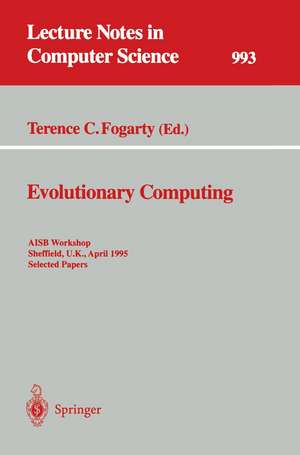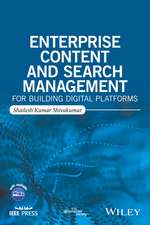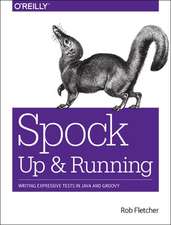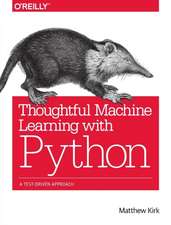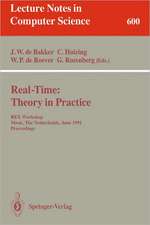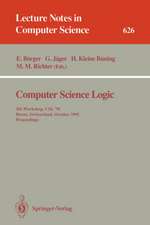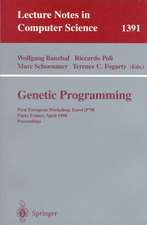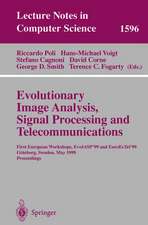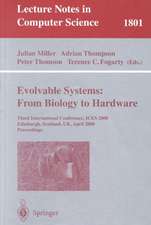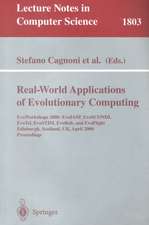Evolutionary Computing: AISB Workshop, Sheffield, U.K., April 3 - 4, 1995. Selected Papers: Lecture Notes in Computer Science, cartea 993
Editat de Terence C. Fogartyen Limba Engleză Paperback – 11 oct 1995
The 18 full papers presented were selected during a post-workshop refereeing meeting and chosen from 32 submissions for the workshop.
The papers are organized in sections on evolutionary computing theory and techniques, timetabling, routing and scheduling, optimization, signal processing and control, and genetic programming. The collection of papers has a certain bias towards real world applications of evolutionary computing and particularly genetic algorithms.
Toate formatele și edițiile
| Toate formatele și edițiile | Preț | Express |
|---|---|---|
| Paperback (3) | 331.58 lei 6-8 săpt. | |
| Springer Berlin, Heidelberg – 11 oct 1995 | 331.58 lei 6-8 săpt. | |
| Springer Berlin, Heidelberg – 11 sep 1996 | 333.72 lei 6-8 săpt. | |
| Springer Berlin, Heidelberg – 28 sep 1994 | 335.18 lei 6-8 săpt. |
Din seria Lecture Notes in Computer Science
- 20%
 Preț: 1061.55 lei
Preț: 1061.55 lei - 20%
 Preț: 307.71 lei
Preț: 307.71 lei - 20%
 Preț: 438.69 lei
Preț: 438.69 lei - 20%
 Preț: 645.28 lei
Preț: 645.28 lei -
 Preț: 410.88 lei
Preț: 410.88 lei - 15%
 Preț: 580.46 lei
Preț: 580.46 lei - 17%
 Preț: 427.22 lei
Preț: 427.22 lei - 20%
 Preț: 596.46 lei
Preț: 596.46 lei -
 Preț: 449.57 lei
Preț: 449.57 lei - 20%
 Preț: 353.50 lei
Preț: 353.50 lei - 20%
 Preț: 1414.79 lei
Preț: 1414.79 lei - 20%
 Preț: 309.90 lei
Preț: 309.90 lei - 20%
 Preț: 583.40 lei
Preț: 583.40 lei - 20%
 Preț: 1075.26 lei
Preț: 1075.26 lei - 20%
 Preț: 310.26 lei
Preț: 310.26 lei - 20%
 Preț: 655.02 lei
Preț: 655.02 lei - 20%
 Preț: 580.93 lei
Preț: 580.93 lei - 20%
 Preț: 340.32 lei
Preț: 340.32 lei - 18%
 Preț: 938.83 lei
Preț: 938.83 lei - 20%
 Preț: 591.51 lei
Preț: 591.51 lei - 15%
 Preț: 438.59 lei
Preț: 438.59 lei - 20%
 Preț: 337.00 lei
Preț: 337.00 lei -
 Preț: 389.48 lei
Preț: 389.48 lei - 20%
 Preț: 607.39 lei
Preț: 607.39 lei - 20%
 Preț: 1024.44 lei
Preț: 1024.44 lei - 20%
 Preț: 579.30 lei
Preț: 579.30 lei - 20%
 Preț: 763.23 lei
Preț: 763.23 lei - 20%
 Preț: 453.32 lei
Preț: 453.32 lei - 20%
 Preț: 575.48 lei
Preț: 575.48 lei - 20%
 Preț: 585.88 lei
Preț: 585.88 lei - 20%
 Preț: 825.93 lei
Preț: 825.93 lei - 20%
 Preț: 763.23 lei
Preț: 763.23 lei - 17%
 Preț: 360.19 lei
Preț: 360.19 lei - 20%
 Preț: 1183.14 lei
Preț: 1183.14 lei - 20%
 Preț: 340.32 lei
Preț: 340.32 lei - 20%
 Preț: 504.57 lei
Preț: 504.57 lei - 20%
 Preț: 369.12 lei
Preț: 369.12 lei - 20%
 Preț: 583.40 lei
Preț: 583.40 lei - 20%
 Preț: 343.62 lei
Preț: 343.62 lei - 20%
 Preț: 350.21 lei
Preț: 350.21 lei - 20%
 Preț: 764.89 lei
Preț: 764.89 lei - 20%
 Preț: 583.40 lei
Preț: 583.40 lei - 20%
 Preț: 649.49 lei
Preț: 649.49 lei - 20%
 Preț: 341.95 lei
Preț: 341.95 lei - 20%
 Preț: 238.01 lei
Preț: 238.01 lei - 20%
 Preț: 538.29 lei
Preț: 538.29 lei
Preț: 331.58 lei
Preț vechi: 414.48 lei
-20% Nou
Puncte Express: 497
Preț estimativ în valută:
63.45€ • 66.24$ • 52.51£
63.45€ • 66.24$ • 52.51£
Carte tipărită la comandă
Livrare economică 04-18 aprilie
Preluare comenzi: 021 569.72.76
Specificații
ISBN-13: 9783540604693
ISBN-10: 3540604693
Pagini: 280
Ilustrații: VIII, 272 p.
Dimensiuni: 155 x 235 x 15 mm
Greutate: 0.4 kg
Ediția:1995
Editura: Springer Berlin, Heidelberg
Colecția Springer
Seria Lecture Notes in Computer Science
Locul publicării:Berlin, Heidelberg, Germany
ISBN-10: 3540604693
Pagini: 280
Ilustrații: VIII, 272 p.
Dimensiuni: 155 x 235 x 15 mm
Greutate: 0.4 kg
Ediția:1995
Editura: Springer Berlin, Heidelberg
Colecția Springer
Seria Lecture Notes in Computer Science
Locul publicării:Berlin, Heidelberg, Germany
Public țintă
ResearchCuprins
Some combinatorial landscapes on which a Genetic Algorithm outperforms other Stochastic iterative methods.- Maximum entropy analysis of genetic algorithm operators.- The ant colony metaphor for searching continuous design spaces.- Broadcast based fitness sharing GA for conflict resolution among autonomous robots.- An adaptive poly-parental recombination strategy.- Neighbourhood seeding to reduce problem modality.- Specialised recombinative operators for timetabling problems.- The use of local search suggestion lists for improving the solution of timetable problems with evolutionary algorithms.- Comparing genetic algorithms, simulated annealing, and stochastic hillclimbing on timetabling problems.- Evolutionary learning in computational ecologies: An application to adaptive distributed routing in communication networks.- The radio link frequency assignment problem: A case study using genetic algorithms.- Scheduling planned maintenance of the national grid.- Genetic operators and constraint handling for pipe network optimization.- A multi-objective approach to constrained optimisation of gas supply networks: The COMOGA method.- Ternary decision diagram optimisation of Reed-Muller logic functions using a genetic algorithm for variable and simplification rule ordering.- An evolutionary algorithm for parametric array signal processing.- Constraints on task and search complexity in GA+NN models of learning and adaptive behaviour.- Load balancing application of the genetic algorithm in a nonstationary environment.- Exploring some commercial applications of genetic programming.
